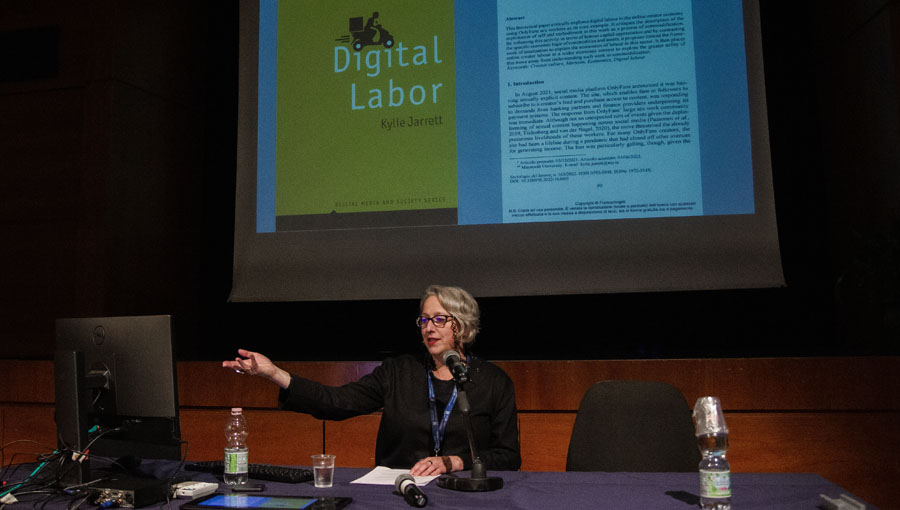Digital Delights and Disturbances: Assetisation of Digital Labor with Dr. Kylie Jarrett

Dr. Kylie Jarrett
JCU’s Department of Communications welcomed Dr. Kylie Jarrett for a talk entitled “Commodification to Assetisation: Reconciling the Delights & Disturbances of Digital Labour” on November 29, 2022. The talk was part of the ongoing lecture series, Digital Delights and Disturbances. Jarrett is Associate Professor in the Department of Media Studies at Maynooth University, Ireland. She’s also the author of various publications like Digital Labor (Polity, 2022) and Feminism, Labour and Digital Media: The Digital Housewife (Routledge, 2016), as well as a wide range of articles exploring the commercial web.
Jarrett began by discussing “creative platform work” present in her latest publication, Digital Labor, which refers to influencers and content creators on social media platforms. She explained that the “marketing of subjectivity” is at the center of content creation because creators must sell a persona to brands and fans to generate revenue. Therefore, one must commodify a personality that is digestible online, regardless of its authenticity. She also noted that content creators are subject to algorithmic biases due to platforms’ policies.
“Creation, management, calibration of identity, selfhood, subjectivity, effect, embodiment, gender, race, sexuality, are at the core of work in the online creator economy,” said Jarrett.
She also said that entrepreneurship is a driving force behind most content creators’ success. Creators must have a passion for their work rooted in optimism to have a competitive advantage in content creation. She quoted Italian media theorist Franco Berardi, who said “the soul of the worker is put to work” as a content creator online. Jarrett used the Kardashian family as an example of content creators who many regard as self-exploitative and self-commodified. Human emotions and experiences now are seen as a source of revenue online rather than a sentimental moment.
However, Jarrett suggested that this critique fails to consider how the creators themselves feel regarding their work. She argued that commodification is not the best way to analyze creative content creation. Commodification theory suggests that a worker’s consciousness becomes detached from their work under Capitalism, however as Jarrett points out, a creator’s reality is the core of content creation. This suggests that a content creator’s consciousness can generate commercial revenue.
Instead, Jarrett builds on the “human capital” theory by Michel Feher and added that creators decide how their subjectivity will generate revenue. She defined “human capital” as the value added to corporations based on their workers’ skillsets, attributes, and work ethics. Therefore, workers are encouraged to become more entrepreneurial to maximize their human capital. She proposes that it is imperative that content creators embody these traits to be successful because they must compete to keep their followers, engagements, and brand partnerships.
“I suggest that the workers in an online platform economy are the ideal human capitalists,” said Jarrett.
She named this phenomenon “assetisation” because creators invest in their assets for profit. She compared eating a piece of cake as a commodity as opposed to analyzing the assets of an Instagram post. Creators aren’t alienated from their content because of the necessity to market subjectivity online. Therefore, one should not describe content creation as a commodity according to Jarrett.





